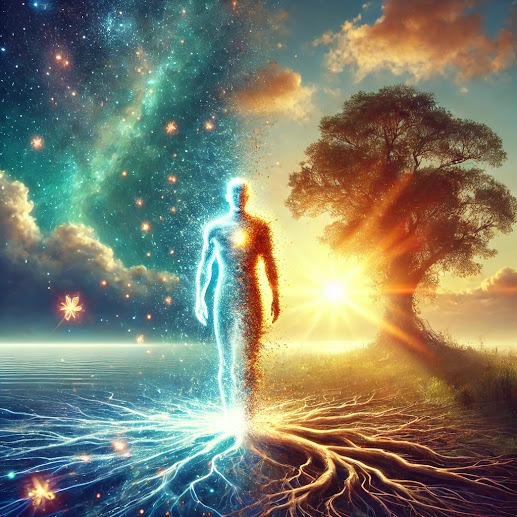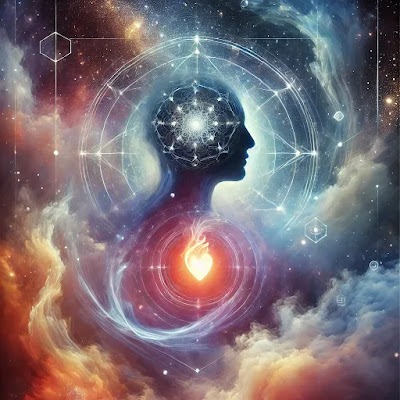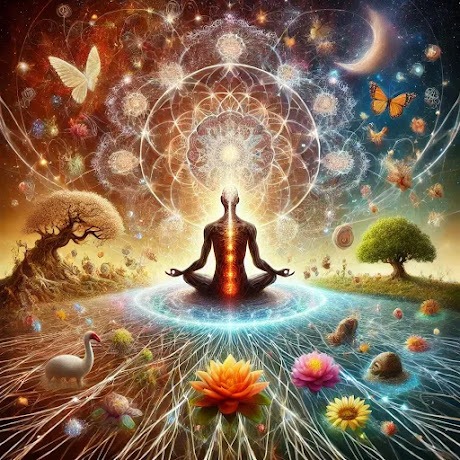LIFE AND REFLECTIONS
The concept of life
Life is the journey of existence, defined by growth, experience, and connection. It’s the biological process that enables survival and reproduction, but also a personal quest for meaning, shaped by relationships, challenges, and personal growth. Life weaves together the physical, emotional, and spiritual aspects, creating a unique story for every living being.
EL AZZOUZI MOHAMMED
11/1/20248 دقيقة قراءة
The Concept of Life and Self:
-Exploring the Interconnectedness of Existence and Identity
The concept of life and self has been a central theme in philosophy, science, religion, and art for millennia. It is an intricate subject that touches on deep questions about existence, identity, consciousness, and the meaning of life. The relationship between life and self is both personal and universal, as every human being seeks to understand their place in the world, the nature of their existence, and the role of their individual self within the larger web of life. In this article, we will delve into various perspectives on life and self, exploring how different fields of thought—from biology and psychology to spirituality and philosophy—have approached these profound concepts. By examining the interconnectedness between life and the self, we aim to shed light on how individuals find meaning, navigate the challenges of existence, and strive for personal growth and fulfillment.
1. The Biological Perspective on Life and Self
From a scientific standpoint, life is a biological process that encompasses the activities and haracteristics of living organisms. In this view, life is defined by the ability to grow, reproduce, respond to stimuli, and adapt to the environment. While biology focuses primarily on the mechanisms that sustain life, it also offers insights into the development of self-identity.
- Cellular Basis of Life: At its most fundamental level, life is composed of cells. These tiny units work together in complex systems to maintain the health and survival of an organism. The human body, with its trillions of cells, is a testament to the complexity and beauty of life. Every cell has a role to play, from the brain cells that process information to the heart cells that pump blood through the body.
- Genetics and Individuality: The biological foundation of self is deeply rooted in genetics. Our DNA contains the blueprint for our physical traits, and it contributes to many aspects of our personality and behavior. While biology determines many factors of life, it is not the sole determinant of the self. The concept of self, while linked to genetics and biology, is also shaped by experiences, relationships, and environment.
-Evolution and the Emergence of Self-Consciousness:
- The Evolution of Intelligence: The evolutionary process has led to the development of complex forms of life, including humans, who possess advanced cognitive abilities. Self-consciousness, or the ability to reflect on one’s own existence, is one of the hallmarks of human intelligence. This awareness of self is what separates humans from other species and gives rise to deeper questions about purpose, meaning, and identity.
- The Role of the Brain: Neuroscience has shown that the human brain plays a crucial role in the formation of the self. It is responsible for processing sensory information, memories, emotions, and thoughts. The prefrontal cortex, in particular, is associated with higher-order thinking, including self-reflection and decision-making. Understanding how the brain contributes to self-awareness provides valuable insights into the nature of the self.
2. The Psychological and Philosophical Dimensions of the Self :
While biology provides the physical framework for life, psychology and philosophy explore the inner workings of the mind and the concept of self. These fields examine how individuals develop a sense of identity, how they perceive the world, and how they navigate the challenges of existence.
Psychological Theories of the Self:
-Self-Identity and Development: Psychologists like Erik Erikson and Carl Rogers have developed theories to explain how the self evolves throughout life. Erikson’s stages of psychosocial development highlight how individuals face different challenges at various stages of life, from childhood to adulthood. Rogers’ concept of the "self-concept" focuses on how people perceive themselves and how this self-image affects their behavior, emotions, and overall well-being.
-The Role of the Ego: Sigmund Freud’s psychoanalytic theory introduced the idea of the ego, which mediates between the individual’s desires (id) and societal expectations (superego). The ego represents the conscious part of the self that deals with reality, making it a central aspect of how we experience life and define ourselves. Freud’s work also underscores the importance of the unconscious mind in shaping the self, highlighting the complexity of human identity. Philosophical Questions About the Self:
- Who Am I?: One of the most fundamental questions in philosophy is, "Who am I?" Philosophers like René Descartes, who famously declared, "Cogito, ergo sum" ("I think, therefore I am"), have long pondered the relationship between thought and existence. Descartes’ philosophy suggests that the act of thinking is proof of the self’s existence, placing the mind at the center of the self.
3. Existentialism and the Meaning of Life
Existentialist philosophers such as Jean-Paul Sartre and Albert Camus have explored the nature of existence and the self, often emphasizing the individual’s responsibility for creating meaning in a seemingly indifferent universe. In this view, life does not have an inherent purpose; rather, individuals must define their own values and purpose through their actions and choices. - The Self as Illusion: Some Eastern philosophical traditions, such as Buddhism, challenge the notion of a permanent, unchanging self. According to Buddhist teachings, the self is an illusion, a product of attachments and desires. The concept of "anatta" (no-self) suggests that true enlightenment comes from recognizing the impermanent nature of existence and transcending the ego. 3. The Role of Relationships in Shaping the Self The self is not developed in isolation but is shaped through relationships with others. Human beings are inherently social creatures, and our interactions with family, friends, colleagues, and society at large play a crucial role in the formation of our identity and our understanding of life.
Social Identity and Group Membership:
- Collective Identity: Sociologists study how individuals derive a sense of self from their membership in social groups. Whether through nationality, religion, ethnicity, or other forms of identity, people often define themselves in relation to the groups to which they belong. Social identity theory suggests that group membership provides individuals with a sense of belonging and helps shape their values, beliefs, and behavior. - Influence of Culture: Culture also plays a significant role in shaping the self. Different cultures have distinct ways of viewing the individual’s role in society, their relationship to others, and their understanding of life. For example, Western cultures often emphasize individualism and personal achievement, while many Eastern cultures prioritize community, family, and collective well-being. Interpersonal Relationships:
- The Importance of Connection: Psychologist Abraham Maslow’s hierarchy of needs highlights the importance of love and belonging in human development. According to Maslow, the need for close relationships and social connection is fundamental to the human experience. Friendships, romantic relationships, and family bonds provide individuals with emotional support, companionship, and a sense of purpose.
- The Mirror of Relationships: The people we interact with often act as mirrors, reflecting aspects of ourselves that we may not be fully aware of. Relationships can challenge us to grow, confront our weaknesses, and better understand our strengths. They provide a context for self-reflection and personal development, influencing how we see ourselves and how we navigate the world.
4. Spiritual and Religious Perspectives on Life and Self
Spirituality and religion offer unique perspectives on life and the self, often addressing the deeper questions of existence, purpose, and the nature of reality. Throughout history, religious traditions have provided frameworks for understanding the self in relation to the cosmos, the divine, and the ultimate meaning of life.
The Search for Meaning:
- Religious Teachings on Life’s Purpose: Many religious traditions offer explanations for the purpose of life and the role of the self. In Christianity, for example, the self is seen as created in the image of God, with a divine purpose that involves love, service, and moral integrity. In Hinduism, the self (Atman) is viewed as part of a greater, eternal reality (Brahman), and the purpose of life is to achieve spiritual enlightenment and union with the divine.
- Spiritual Growth and Self-Realization: Across different spiritual traditions, the concept of self-realization or spiritual awakening is a common theme. This involves transcending the ego and realizing a higher state of consciousness or oneness with the universe. Practices such as meditation, prayer, and contemplation are often used to quiet the mind and connect with the deeper aspects of the self and the universe.
Mysticism and the Transcendent Self:
- Unity with the Divine: Mysticism, found in various religious traditions, often emphasizes the dissolution of the individual self and the experience of unity with the divine or the cosmos. Mystics like Rumi, St. Teresa of Ávila, and the Sufi poets have written extensively about the experience of transcending the ego and merging with a higher spiritual reality. These experiences challenge the conventional understanding of the self and highlight the interconnectedness of all life.
- The Eternal Nature of the Soul: Many religious traditions, such as those in Hinduism and Christianity, hold that the self is not confined to this physical life but continues in some form after death. Belief in the soul or spirit suggests that life is part of a larger, eternal journey, and the self plays a role in this ongoing cycle of birth, death, and rebirth.
5.The Self in the Context of Modern Life
In contemporary society, the concept of the self is increasingly complex, influenced by globalization, technological advancements, and shifting cultural norms. Individuals today must navigate a world that is constantly changing, and the concept of life and self is evolving accordingly.
The Impact of Technology on Identity:
- Digital Selves: The rise of the internet and social media has given people new ways to express themselves and connect with others."
The concept of digital selves refers to how individuals present, express, and curate their identities online through various digital platforms such as social media, blogs, and forums. Unlike face-to-face interactions, the digital world offers flexibility in how one chooses to present themselves, often allowing for a more curated or even entirely different persona than their physical self.
Key Aspects of Digital Selves:
1. Curated Identities:
People have the power to control what aspects of their lives they share, from their physical appearance (using filters, editing, etc.) to their opinions, achievements, and interests.
Social media profiles often showcase an idealized version of one’s life, highlighting positive experiences while omitting struggles or failures.
2. Multiple Personas:
Online, individuals can have different personas on various platforms. For example, someone might maintain a professional image on LinkedIn, a personal and casual persona on Instagram, and a humorous or anonymous personality on platforms like Reddit or Twitter.
3. Connection and Community:
Social media allows people to connect with others across the globe, creating communities based on shared interests, beliefs, and identities.
Individuals can find support groups, join niche communities, and participate in global conversations, allowing for both a broadening of social circles and the formation of close-knit, like-minded communities.
4. Performance of Self:
Online identities often involve performance, where individuals may consciously or subconsciously modify their behavior to fit the expectations of their audience or followers.
This can lead to pressure to maintain a consistent or ideal image, especially among influencers or people with large followings.
5. Impact on Self-Perception:
Constant exposure to the curated lives of others can lead to comparisons and affect self-esteem. Studies have shown that heavy social media use can be linked to feelings of inadequacy, depression, and anxiety.
6. Blurring of Public and Private Life:
Social media often blurs the line between private and public life. What once may have been private (family events, opinions, personal milestones) is now shared with a broader audience.
This can lead to the development of parasocial relationships, where followers feel personally connected to public figures despite the relationship being one-sided.
The Future of Digital Selves:
As virtual spaces evolve with technologies like the metaverse or advanced virtual reality, the way we express and experience our digital selves could change even more dramatically. People may soon be able to create avatars or fully immersive representations of themselves in 3D worlds, further blurring the lines between the digital and physical self.
The rise of these digital selves has fundamentally changed how we perceive identity, relationships, and communication. What began as a simple way to stay connected has transformed into a complex ecosystem of digital identities.
Conclusion :
The concept of life and self is a profound and complex tapestry woven from our experiences, relationships, beliefs, and the ever-evolving understanding of our own consciousness. The journey of understanding the self—the inner core of identity—intertwines deeply with the meaning we attach to life. This pursuit often brings forth questions about purpose, identity, and existence, with answers that may shift over time as we grow and our perspectives broaden. In the quest to define who we are, we continuously shape and reshape our lives, ultimately realizing that both life and self are dynamic, ever-changing processes. This perspective invites us to live authentically, embracing both the certainty of change and the ongoing exploration of what it means to truly be ourselves in an intricate, interconnected world.






